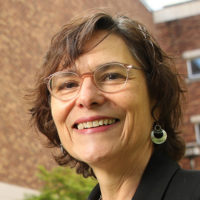 As a first-year medical student, Ramoncita “Raye” Maestas, MD ’83, UW professor in the Department of Family Medicine, recalls slouching in a chair in the T wing of the University of Washington’s Health Sciences Building, wondering if she had made a mistake. Was she really on the right professional path? Could she meet the academic challenges of medical school? Did she have what it takes to be a doctor?
As a first-year medical student, Ramoncita “Raye” Maestas, MD ’83, UW professor in the Department of Family Medicine, recalls slouching in a chair in the T wing of the University of Washington’s Health Sciences Building, wondering if she had made a mistake. Was she really on the right professional path? Could she meet the academic challenges of medical school? Did she have what it takes to be a doctor?
Although she didn’t know it then, the answer to all of her questions was a resounding yes. Maestas was about to embark on a 35-year career as a family physician, teacher and mentor at the University of Washington School of Medicine, retiring in May 2021. And her experiences overcoming self-doubt would fuel a lifelong desire to support medical students, culminating in her role as associate dean for the Office of Student Affairs.
Answering the Call to Family Medicine
The seeds of Maestas’ own medical ambitions were sowed in childhood. She grew up on a farm in northern New Mexico, where her parents lived off the land, raised cattle — and instilled the importance of education in their children. “As a young boy, my dad was tending sheep and never completed eighth grade, and my mother didn’t finish high school. Given their inability to pursue further schooling, education was something they valued highly,” says Maestas.
Her adolescence was rich in close family relationships, neighborly bonds and Roman Catholic tradition, but material wealth was scarce in the predominantly Spanish-speaking community where she lived. So too was access to healthcare; health insurance was a luxury that most could not afford. Lack of transportation, language and distance to medical facilities were also obstacles to receiving healthcare.
“I remember women delivering stillborn babies, others suffering from disabling conditions and even dying young, in large part because they couldn’t surmount barriers to care,” says Maestas.
As an undergraduate at New Mexico State University, Maestas began to reflect on the healthcare disparities that she had seen in her community, and her dream of becoming a doctor took root.
“I wanted to be a family physician, so I could be there for people from birth all the way to the end of life,” says Maestas.
Mentorship Makes the Difference
The journey from aspiring physician to confident clinician is seldom smooth. For many students, mentorship plays a crucial role in shaping their professional development. On her own mentor’s advice, Maestas decided to attend the University of Washington School of Medicine, where she received scholarships that enabled her to pursue her dreams.
“Family medicine isn’t a specialty that’s going to make you rich monetarily, but it’s very gratifying, and it was where I felt like I could make the most difference,” says Maestas. “Scholarships made it possible for me to follow my calling.”
Mentorship also served as a source of encouragement and emotional support while Maestas adjusted to medical school. “I was not a stellar student at first, but my faculty mentors went out of their way to listen to me and to let me know they believed in me. It was a personal touch that I never forgot.”
This personal touch would lay the foundation for Maestas’s career. Following her residency at Providence Hospital (now the Swedish Cherry Hill campus), Maestas created a pilot residency program at Sea Mar Community Health Centers, which specializes in delivering health and social services to Spanish-speaking and underserved populations. She also began cultivating her interest in medical education, directing the behavioral medicine curriculum for residents at both Providence and Sea Mar.
In 2002, Maestas joined the Family Medicine Clinic at Harborview Medical Center, caring for the community’s most vulnerable patients. She was also recruited to lead the UW School of Medicine’s Denali College. The goals of the then-newly established Colleges System — matching students with faculty mentors and offering a curriculum focused on clinical skills and professionalism — aligned with Maestas’ desire to improve the medical school experience.
“Mentorship made all the difference for me,” says Maestas. “The Colleges System gives every student consistent access to mentors who can teach them the fundamentals of patient-centered care and set them up for success.”
Support for Every Student
In 2016, Maestas’s passion for helping students succeed led her to take on the role of assistant dean for the Office of Student Affairs. The office supports medical students’ personal and professional development through an array of services including academic advising, tutoring, financial aid, mental health counseling, student wellness, monitoring and improving the learning environment and providing service learning opportunities.
Maestas also partnered with the Center for Equity, Diversity and Inclusion to launch the Underrepresented in Medicine Student Group, a student-run group that helps peers from historically underrepresented backgrounds flourish in medical school.
When Maestas became associate dean, she implemented a proactive advising system to provide more seamless support for students. The program provides early outreach to help students prioritize and reach their goals, identify academic or personal challenges and access resources to address those challenges.
“Life happens — we all stumble sometimes. I want every student to know that they matter, that a personal or academic challenge, misstep or crisis doesn’t define them as budding professionals,” says Maestas. “We’re here to help them plan a thoughtful path through medical school and meet any challenges that arise along the way.”
Maestas is proud of the accomplishments she and her staff in the Office of Student Affairs have achieved, but she sees ample opportunities for expanding its services in the future. Philanthropic support would boost resources for neurodiverse learners and increase access to mental health counseling and tutoring. In the next five to 10 years, Maestas also hopes to see more robust use of universal design, an inclusive approach to curriculum development and student services that ensures access for everyone, regardless of ability or disability.
On May 31, 2021, Maestas retired, leaving an impressive legacy as a steadfast patient advocate and a champion of students’ hopes and dreams. But despite retiring, mentoring remains close to her heart, and she plans to continue pursuing volunteering and service-learning projects at the UW School of Medicine.
“It’s been an honor to work with such an incredible team and such inspiring students,” says Maestas. “They have taught me so much over the years, and I look forward to building more of those connections.”

